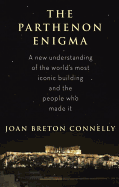 Joan Breton Connelly (Get this book)
Joan Breton Connelly (Get this book) Universally recognized as a symbol of Western democracy, the Parthenon emerges in Connelly's bold new analysis as a shrine memorializing myths radically alien to modern politics. Newly recovered classical literary texts and surprising archaeological finds compel readers to acknowledge the implausibility of the usual interpretation of the Parthenon's frieze sculptures as a depiction of fifth-century Athenians celebrating their Panathenaic Festival. Newly aware of the potent message embedded in the Parthenon frieze as a whole, many readers will endorse Connelly's concluding appeal to British authorities, asking them to return to Greece the priceless pieces of the frieze that have long been held in London. An explosive reinterpretation of a classical icon.--Booklist








